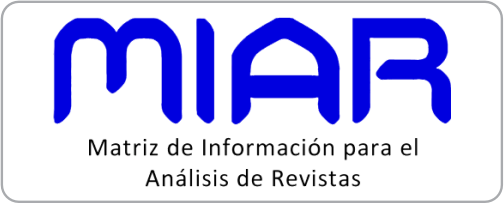Enfoque sistémico-cibernético en el diseño de sistema de gestión de una institución de educación superior universitaria
DOI:
https://doi.org/10.51252/rcsi.v2i1.250Palabras clave:
acreditación, cibernética organizacional, holística, mapa de procesosResumen
La investigación incide en el diseño del sistema de gestión en la “institución de educación superior universitaria” (IESU) con fines de acreditación mediante el enfoque sistémico-cibernético. El propósito es detallar la construcción del sistema de gestión basada en procesos. La metodología de diseño sistémico-cibernético es utilizada enfocada a atender criterios provenientes de la normatividad pertinente a la IESU y estandarización de sistemas de gestión. Los resultados fueron el modelo de sistema viable de la facultad, los procesos agrupados en funciones sistémicas y el mapa de procesos. Asimismo, la investigación evidencia la viabilidad organizacional de la IESU y concluye que el enfoque sistémico-cibernético aborda la organización esclareciendo sus fines y medios organizacionales deseables e idealizados, ello incide en el diseño del sistema de gestión propio y particular de la institución
Citas
Ackoff, R. (2006). Why Few Organizations Adopt Systems Thinking. Systems Research and Behavioral Science, 23(5), 705-708.
https://doi.org/10.1002/sres.791
Beer, S. (1985). Diagnosing the System for Organizations (1sd ed.). Wiley.
Bretz, L., Könemann, U., Anacker, H., & Dumitrescu, R. (2020). A contribution to the design of organizational structures suitable for Systems Engineering. Procedia CIRP 91, 101-106. https://doi.org/10.1016/j.procir.2020.02.154
Checkland, P. (2019). Reflections on 40 years in the management field: A Parthian shot (friendly). Journal of the Operational Research Society, 70(8), 1219-1223. https://doi.org/10.1080/01605682.2019.1590137
Churchman, C. W. (1968). The Systems Approach. Delacorte Press.
Churchman, C. (1995). Ethics and Science. Systems Research, 12(4), 267-271. https://doi.org/10.1002/sres.3850120406
Collopy, F. (2019). Why the Failure of Systems Thinking Should Inform the Future of Design Thinking. Design Issues, 97–100.
https://doi.org/10.1162/desi_a_00538
Espejo, R., & Reyes, A. (2011). Organizational Systems: Managing Complexity with the Viable System Model. Springer
Flores, S., & Ludueña, M. (1983). Teoría General de Sistemas y Cibernética, Cuaderno Nro 7. Grupo de Estudios de Sistemas Integrados.
Glanville, R. (2007). Try again. Fail again. Fail better:the cybernetics in design and thedesign in cybernetics. Kybernetes, 36(9/10), 1173-1206. https://doi.org/10.1108/03684920710827238
Hernández Sampieri, R., Fernández Collado, C., & Baptista Lucio, P. (2014). Metodología de la Investigación. Mc Graw Hill Education.
Hurtado de Barrera, J. (2010). Metodología de la Investigación. Guía para la comprensión holística de la ciencia. Quirón.
Jackson, M. (2019). Critical Systems Thinking and the Management of Complexity. John Wiley & Sons Ltd.
Ley General de Educación, Ley Nro. 28044 [MINEDU]. (28 de Julio de 2003). Lima, Lima, Perú.
Decreto Supremo Nº 012-2020-MINEDU del 2020 [MINEDU]. Política Nacional de Educación Superior y Técnico-Productiva.(31 de agosto del 2020). Lima, Lima, Perú
Nadler, G. (1985). Systems methodology and design. IEEE Transactions on Systems, Man, and Cybernetics, 15(6), 685–697. https://doi.org/10.1109/TSMC.1985.6313452
Pérez Ríos, J. (2012). Design and Diagnosis for Sustainable Organizations The Viable System Method. Springer.
Saeed Rezk, S., & Gamal, S. (2019). An Organizational Cybernetics Framework for Designing a Viable Higher Education System. Systemic Practice and Action Research, 33, 703–724. https://doi.org/10.1007/s11213-019-09505-9
Schwaninger, M. (2009). Intelligent Organizations. Germany: Springer.
Taipe Castro, R. (2009c). Diseño de la universidad basado en el enfoque de sistema viable. Tomo III. UNCP.
Taipe Castro, R. (2018). Estudio sistémico interpretativo de una institución de educación superior universitaria para el diseño de un sistema de gestión. UNCP.
Taipe Castro, R. M. (2009a). Identificación y análisis de la UNCP Tomo I. UNCP.
Taipe Castro, R. M. (2009b). Diagnóstico de la universidad basado en el enfoque de sistema viable Tomo II. UNCP.
UNESCO. (2017). Six ways to ensure higher education leaves no one behind. Global Education Monitoring.
Vriens, D., & Achterbergh, J. (2011). Cybernetically sound organizational structures I: de Sitter’s design theory. Kybernetes, 40(3/4), 405-424.
Publicado
Cómo citar
Número
Sección
Licencia
Derechos de autor 2022 Robensoy Marco Taipe-Castro

Esta obra está bajo una licencia internacional Creative Commons Atribución 4.0.
Los autores retienen sus derechos:
a. Los autores retienen sus derechos de marca y patente, y tambien sobre cualquier proceso o procedimiento descrito en el artículo.
b. Los autores retienen el derecho de compartir, copiar, distribuir, ejecutar y comunicar públicamente el articulo publicado en la Revista Científica de Sistemas e Informática (RCSI) (por ejemplo, colocarlo en un repositorio institucional o publicarlo en un libro), con un reconocimiento de su publicación inicial en la RCSI.
c. Los autores retienen el derecho a hacer una posterior publicación de su trabajo, de utilizar el artículo o cualquier parte de aquel (por ejemplo: una compilación de sus trabajos, notas para conferencias, tesis, o para un libro), siempre que indiquen la fuente de publicación (autores del trabajo, revista, volumen, número y fecha).















